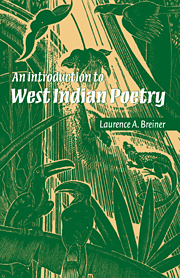Book contents
- Frontmatter
- Contents
- Preface
- Chronology for Anglophone Caribbean poetry
- Map of the Caribbean
- 1 West Indian poetry and its audience
- 2 The Caribbean neighborhood
- 3 Overview of West Indian literary histories
- 4 The relation to “Europe”
- 5 The relation to “Africa”
- 6 The relation to “America”
- Notes
- Guide to further reading
- Index
3 - Overview of West Indian literary histories
Published online by Cambridge University Press: 06 January 2010
- Frontmatter
- Contents
- Preface
- Chronology for Anglophone Caribbean poetry
- Map of the Caribbean
- 1 West Indian poetry and its audience
- 2 The Caribbean neighborhood
- 3 Overview of West Indian literary histories
- 4 The relation to “Europe”
- 5 The relation to “Africa”
- 6 The relation to “America”
- Notes
- Guide to further reading
- Index
Summary
The territories of the Anglophone Caribbean share with the rest of the region approximately the same historical circumstances and experience the same intellectual trajectory, which can be described loosely as leading from a prise de conscience through assertion and subsequent exploration of national identity. But there are significant differences in the West Indian situation. Most important, West Indian literature begins in this century virtually from nothing. Writing in Haiti or Cuba builds upon an extensive history of literary activity in the island. However imitative it may be at certain periods, it remains a local phenomenon with a local audience. Literary activity is underwritten by a coherent tradition, and has earned acceptance from the society. Whether an individual writer chooses to embrace or resist this tradition, its mere existence legitimizes his work, and so relieves him of the task of legitimizing himself. In the Anglophone Caribbean, on the other hand, the only literary tradition was metropolitan, not local. This meant that an individual undertaking to write in the West Indies had recourse only to a tradition of books, not one of literary activity. The aspiring poet had to stand in relation to English literary history at its best, as it survived in monuments of accomplishment. Since very few West Indian writers or would-be writers had the experience of working in London (or for that matter in North America) until the 1950s, this intimidating circumstance was not relieved by familiarity with well-known living writers, the contemporary face of English literature as a social activity.
- Type
- Chapter
- Information
- An Introduction to West Indian Poetry , pp. 59 - 103Publisher: Cambridge University PressPrint publication year: 1998



